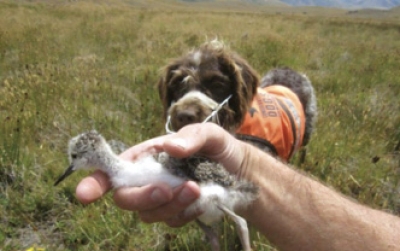Monday, 22 July 2019 00:34
Protecting our kakī
By DOC Ranger Cody Thyne
As a ranger based in Twizel the main part of my job is supporting the Kakī Recovery Programme.
Kakī/black stilts are one of New Zealand’s rarest birds and the mission of the Kakī Recovery Programme is to increase their
population in the wild and ensure this special bird is not lost for future generations.
population in the wild and ensure this special bird is not lost for future generations.
As part of a small team of four permanent and a few seasonal staff, my responsibilities involve managing kakī in the wild. This includes counting how many adults are out there; traipsing up and down numerous braided rivers in the Mackenzie Basin searching for breeding pairs; observing and interpreting behaviour; finding their nests; reading leg bands and collecting eggs fromthe wild to bring back to the captive rearing facility in Twizel.
Walking up and down large braided rivers isn’t for everyone, particularly if you don’t like uneven ground, stumbling around,
getting your feet and other body parts wet, super hot days with no shade, howling winds, abrupt temperature changes, long periods of time staring through a spotting scope with one eye, and lunchtime sandwiches turning to toast when exposed to the dry alpine air. However, the views are breathtaking, and the chance to see wildlife that manages to scrape out a living in this environment, is definitely worth the trip.
The eggs I collect are brought back to the captive rearing facility in Twizel which is also home to a number of kakī pairs for captive breeding.
The facility is where kakī eggs are artificially incubated and young chicks are raised in captivity.
At 3–9 months they are released into the wild. Rearing them in captivity significantly increases their chances of survival by
preventing predation when they are most vulnerable and it also gets them through their first winter, which can be tough for young birds in the wild.
Published in
Issue 161
Tagged under
Image Gallery
View the embedded image gallery online at:
https://ducks.org.nz/flight-magazine/item/281-protecting-our-kaki#sigProIdf836805b55
https://ducks.org.nz/flight-magazine/item/281-protecting-our-kaki#sigProIdf836805b55


